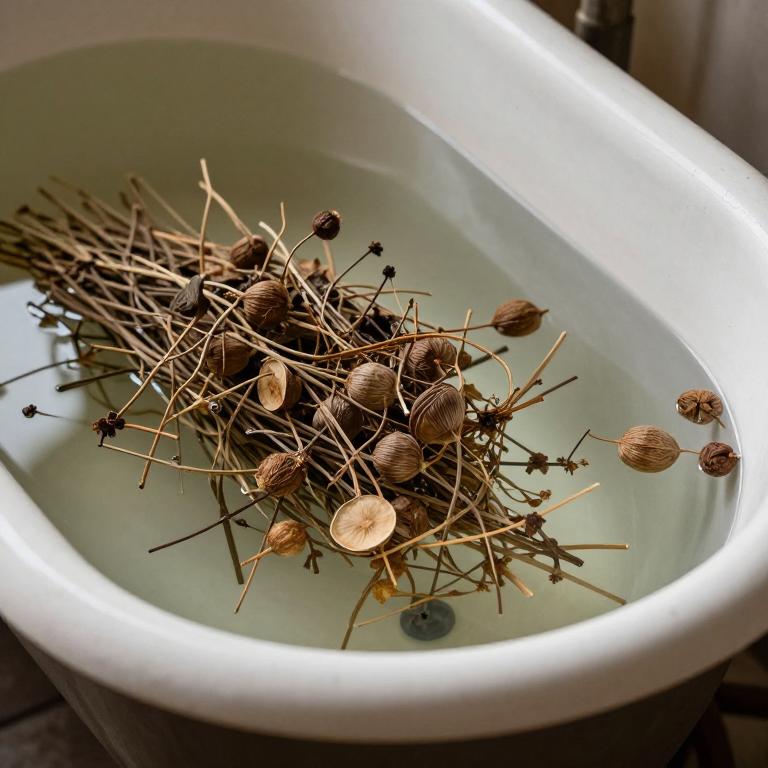10 Best Herbal Baths For Sinusitis

Herbal baths can be a soothing and natural remedy for individuals suffering from sinusitis, as the steam from warm water helps to open up nasal passages and reduce congestion.
Certain herbs, such as eucalyptus, chamomile, and lavender, are commonly used in these baths due to their anti-inflammatory and decongestant properties. Adding a few drops of essential oils to the bath water can enhance the therapeutic effects and provide a calming aromatherapy experience. The heat from the bath also promotes relaxation, which can help alleviate the stress often associated with chronic sinus issues.
While herbal baths are not a cure for sinusitis, they can be a valuable complementary therapy to support overall respiratory health and comfort.
Table of Contents
- 1. Eucalyptus (Eucalyptus globulus)
- 2. Rosemary (Rosmarinus officinalis)
- 3. Salvia (Salvia officinalis)
- 4. Thyme (Thymus vulgaris)
- 5. Peppermint (Mentha piperita)
- 6. Ginger (Zingiber officinale)
- 7. Stinging nettle (Urtica dioica)
- 8. Ceylon cinnamon (Cinnamomum verum)
- 9. Catnip (Nepeta cataria)
- 10. German chamomile (Chamomilla recutita)
1. Eucalyptus (Eucalyptus globulus)

Eucalyptus globulus, commonly known as Australian eucalyptus, is often used in herbal baths to help alleviate symptoms of sinusitis due to its potent anti-inflammatory and decongestant properties.
When added to warm water, the essential oils from eucalyptus globulus release aromatic vapors that can help open up nasal passages and reduce congestion. The steam from the bath can also help soothe irritated sinuses and promote easier breathing, providing natural relief from sinus pressure and headaches. However, it is important to dilute the essential oils properly to avoid skin irritation and ensure safe use.
While herbal baths may offer complementary relief, they should not replace professional medical treatment for chronic or severe sinusitis.
2. Rosemary (Rosmarinus officinalis)

Rosmarinus officinalis, commonly known as rosemary, has been traditionally used in herbal baths to alleviate symptoms of sinusitis due to its antimicrobial and anti-inflammatory properties.
When infused into bath water, rosemary essential oil can help reduce nasal congestion and promote respiratory clarity by stimulating blood circulation and easing mucus buildup. The aromatic compounds in rosemary also have a calming effect, which can help relieve the stress often associated with chronic sinus issues. Additionally, the warm water of the bath enhances the absorption of the essential oils, allowing the therapeutic benefits to penetrate the skin and reach the respiratory system more effectively.
Overall, incorporating rosemary into a herbal bath can serve as a natural, soothing remedy to support healing and comfort for individuals suffering from sinusitis.
3. Salvia (Salvia officinalis)

Salvia officinalis, commonly known as sage, has been traditionally used in herbal baths to alleviate symptoms of sinusitis due to its antimicrobial and anti-inflammatory properties.
When infused into bath water, sage can help reduce nasal congestion and soothe irritated sinuses by promoting drainage and easing inflammation. The aromatic compounds in sage, such as thujone and camphor, may also have a calming effect on the respiratory system, enhancing overall respiratory comfort. Herbal baths with sage are often recommended as a natural, holistic approach to support healing without the side effects of pharmaceuticals.
However, it is advisable to consult a healthcare professional before using sage baths, especially for individuals with sensitive skin or existing health conditions.
4. Thyme (Thymus vulgaris)

Thymus vulgaris, commonly known as thyme, has been traditionally used in herbal baths to support respiratory health and alleviate symptoms of sinusitis.
The essential oils derived from thyme contain compounds like thymol, which possess antimicrobial and anti-inflammatory properties that may help reduce nasal congestion and sinus inflammation. When used in a warm herbal bath, thyme can promote relaxation and improve overall immune function, potentially aiding in the body's fight against sinus infections. However, it is important to dilute thyme essential oil properly to avoid skin irritation, as it is highly concentrated.
While herbal baths may offer complementary relief, they should not replace medical treatment for severe or persistent sinusitis.
5. Peppermint (Mentha piperita)

Mentha piperita, commonly known as peppermint, has been traditionally used in herbal baths to alleviate symptoms of sinusitis due to its cooling and decongestant properties.
When added to warm water, peppermint essential oil or fresh leaves can help open up nasal passages and reduce sinus pressure, providing relief from congestion and headaches. The aromatic vapors from the bath stimulate the respiratory system, promoting clearer breathing and easing inflammation in the sinuses. This natural remedy is particularly beneficial for those seeking non-pharmacological options to manage chronic or seasonal sinus issues.
While it may not cure sinusitis, peppermint baths can be a soothing complementary therapy to support overall respiratory health.
6. Ginger (Zingiber officinale)

Zingiber officinale, commonly known as ginger, has been traditionally used in herbal baths to alleviate symptoms of sinusitis due to its anti-inflammatory and decongestant properties.
When added to warm water for a bath, ginger can help soothe nasal congestion and reduce inflammation in the sinus passages. The aromatic compounds in ginger may also help open up the airways, promoting easier breathing and reducing the feeling of sinus pressure. This natural remedy is often preferred by individuals seeking alternative therapies to complement conventional treatments for sinusitis.
However, it is important to consult with a healthcare professional before using ginger baths, especially for those with sensitive skin or underlying health conditions.
7. Stinging nettle (Urtica dioica)

Urtica dioica, commonly known as stinging nettle, has been traditionally used in herbal baths to alleviate symptoms of sinusitis due to its anti-inflammatory and decongestant properties.
When infused into bath water, the compounds in stinging nettle, such as histamine and formic acid, can help reduce nasal congestion and soothe inflamed sinus tissues. The warm water of the herbal bath promotes circulation and may help drain mucus more effectively, offering relief from sinus pressure and discomfort. However, it is important to dilute the nettle properly to avoid skin irritation, as the plant can cause a stinging sensation when applied directly.
While not a substitute for medical treatment, stinging nettle baths can serve as a complementary therapy to support overall sinus health.
8. Ceylon cinnamon (Cinnamomum verum)

Cinnamomum verum, commonly known as true cinnamon, has been traditionally used in herbal baths to alleviate symptoms of sinusitis due to its warming and anti-inflammatory properties.
When infused into bath water, the essential oils from cinnamon can help open nasal passages and reduce congestion by promoting circulation and easing sinus pressure. The aromatic compounds in cinnamon, such as cinnamaldehyde, possess antimicrobial and decongestant effects that may support the body's natural healing process. Taking a warm cinnamon-infused bath can also provide overall relaxation, which is beneficial for individuals suffering from the discomfort of sinusitis.
However, it is important to consult with a healthcare professional before using cinnamon baths, especially for those with sensitive skin or existing medical conditions.
9. Catnip (Nepeta cataria)

Nepeta cataria, commonly known as catnip, has been traditionally used in herbal remedies for its potential respiratory benefits.
When used in herbal baths, nepeta cataria may help alleviate symptoms of sinusitis by promoting relaxation and reducing nasal congestion. The aromatic compounds in catnip can stimulate the release of mucus, aiding in the drainage of sinus passages. However, while some individuals find relief from sinus pressure and inflammation through these baths, scientific evidence supporting its efficacy for sinusitis is limited.
It is important to consult a healthcare professional before using catnip or any herbal remedy, especially for chronic or severe sinus conditions.
10. German chamomile (Chamomilla recutita)

Chamomilla recutita, commonly known as German chamomile, has been traditionally used in herbal baths to alleviate symptoms of sinusitis due to its anti-inflammatory and antimicrobial properties.
When infused into warm water, chamomile creates a soothing bath that can help reduce nasal congestion and ease facial pain associated with sinus inflammation. The essential oils in chamomile, such as bisabolol and chamazulene, are believed to have a calming effect on the respiratory system and promote drainage of the sinuses. Taking a chamomile-infused bath can also help relieve headaches and improve overall respiratory comfort.
While not a substitute for medical treatment, this natural remedy can be a complementary therapy for managing sinusitis symptoms.